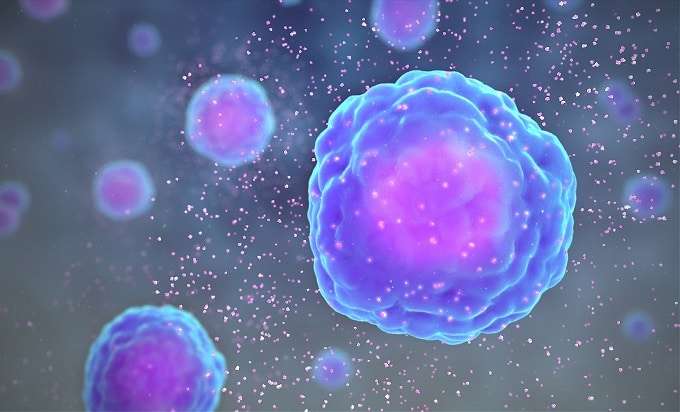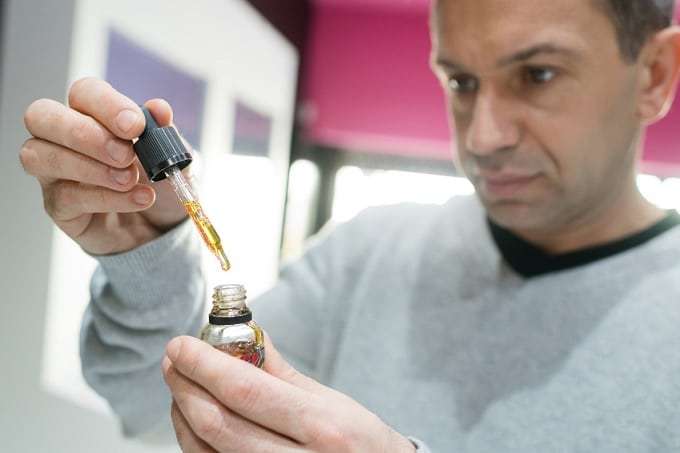CBD for Inflammation
Our body’s first line of defense against any form of irritation, injury, or infection is inflammation.
But did you know that sometimes what should have been our body’s natural defense is also what makes our health problems worse?
The Good and the Bad of Inflammation
Whenever there is any injury to the tissues, the immune cells will flock to the area in an attempt to control the irritant and get rid of it so the tissues could heal.
Some of these immune cells recruit other immune cells to help, and they do this by producing and releasing substances called pro-inflammatory cytokines.
It is these cytokines that will “call for help” and send the signal for more immune cells to migrate to the injured site.
Left alone, the inflammatory process will worsen.
So to control them, anti-inflammatory cytokines are produced by the other types of immune cells.
They will tell the pro-inflammatory cells to “calm down” and stop their recruitment of more immune cells.
In normal situations, all will be well. Inflammation, with the help of pro-inflammatory cytokines, gets rid of the irritant.
The anti-inflammatory cytokines, in turn, will help the tissues heal by controlling inflammation.
In a normal situation, that is.
Unfortunately, it doesn’t always work that way. Instead of controlling inflammation, the immune response goes wild.
The cytokines recruit and recruit more immune cells, and they will produce and release more cytokines.
Our body’s natural defense then becomes our biggest attacker as the inflammatory process turns ugly and the vicious cycle goes on.
There are many factors why the immune response goes haywire — strong irritants and pathogens, genetic predisposition, autoimmune problems, and even your habit and lifestyle.
Inflammation’s Effects on the Body
Inflammation, as mentioned above, can worsen diseases and disorders.
Take for example rheumatoid arthritis, a type of autoimmune disease that causes systemic inflammation and affects multiple joints and organs.
The presence of cytokines signaling more immune cells only worsens inflammation.
And inflammation of the joints, when it’s chronic, causes permanent joint damage and deformities.
In Chron’s disease, the cytokines’ recruitment of more immune cells not only contributes to the formation of the ulcers, but they are also responsible for the thickening of the intestinal walls and adhesions.
These cause bowel obstructions as well as absorption problems.
Abnormal immune response to the axon’s myelin sheath is what makes multiple sclerosis worse.
With the cytokines attacking the myelin sheath of the neuron’s axon, transmission of signals is impaired, resulting in debilitating motor and sensory problems.
Inflammation can play a role in epilepsy.
The presence of cytokines not only makes the neurons more excitable enough to trigger a seizure, but they also worsen excitotoxicity which contributes to the death of neurons.
Excitotoxicity is a state in which the neurons die because of over-activation by excitatory neurotransmitters like glutamate.
Cancer, though it may be hard to believe, is also affected by immune cells since cancer cells can “hijack” a type of immune cell.
Instead of getting rid of the cancer cells, these immune cells protect them and even act as their chaperons, giving them the ability to metastasize.
Because of inflammation’s effect on excitatory neurotransmitters and excitotoxicity, it can worsen anxiety and depressive disorders and autism.
So, really, inflammation can be so ugly at times it can hurt us, not help us.
Medications are given to control the symptoms, reduce inflammation, and sometimes even inhibit the immune system itself from attacking the body.
Sadly, even though these drugs do help, they have side effects that can also harm the body.
Where There’s Inflammation, There’s Pain

An unfortunate truth, but a truth nonetheless.
And we can all blame cytokines (again!) for that, you know.
Cytokines stimulate the pain receptors of neurons, so the longer they stay in the system, the longer they activate our pain receptors.
In fact, cytokines play a major role in pathologic pain or pain caused by injuries.
They can aggravate pain from simple muscle injuries like muscle strain, cramps, and spasms, and cytokines can also worsen neuropathic pain associated with multiple sclerosis, diabetes, cancer, and sciatica.
CBD is an Excellent Anti-Inflammatory Compound
Although THC is also a potent anti-inflammatory compound, it’s CBD, really, that takes the stage.
Why?
CBD is just as potent as THC when it comes to controlling inflammation, but it won’t make you high.
Plus, it is also a very potent antioxidant that it can even help protect the cells from excitotoxicity!
Let’s explore how CBD produces its anti-inflammatory effects.
CB1 and CB2 Receptors
When CBD binds to the CB2 receptors of the overactive immune cells, it will stimulate a certain type of anti-inflammatory protein called the caspase.
When the caspase is activated, it will send a signal that induces the start of the cell death or apoptosis of the immune cell.
With the immune cells dying through caspase activation, the inflammatory process is controlled and production of cytokines is reduced.
But this is not all. CBD still has another way to control inflammation.
CBD can also induce apoptosis by increasing the production of reactive oxygen species (ROS) in the immune cells.
Now, you might be wondering why this would be good when ROS, a byproduct of metabolism, can also be pretty damaging.
After all, too much ROS can lead to oxidative stress, a state in which there is an imbalance between the free radicals and the antioxidants that neutralize them.
And we all know what happens when there is a high level of free radicals, right?
It will damage more cells, worsen inflammation, and contribute to disease progression.
What’s very fascinating about CBD is that it can stimulate the immune cells to increase their generation of ROS which, in turn, speeds up their oxidative stress.
Naturally, this will result in apoptosis of the immune cells and reduction in pro-inflammatory cytokines.
But CBD will not affect the healthy cells and won’t do any damage to them.
In a way, while CBD controls inflammation, it also protects the healthy cells at the same time.
CBD and Neuroinflammation
CBD gets even more interesting, let me tell you.
It targets cells with abnormally functioning mitochondria.
The mitochondria, known as the powerhouse of the cell, are what produce and release energy.
But their metabolism also produces reactive oxygen species.
Under stress and injury, the mitochondria generate more ROS, release more intracellular calcium, and worsen inflammation.
Calcium is important since it is a key player in many physiological responses.
But too much calcium within the cells also contributes to oxidative stress and excitotoxicity and makes the cells more sensitive to excitatory neurotransmitters.
What CBD does is to influence a certain type of “gate” called NCX within the mitochondria.
This “gate” regulates the release and uptake of calcium from the mitochondria.
Too much calcium?
Here, says CBD, let’s open the gate and allow the mitochondria to absorb them. After all, that is where calcium is stored.
Too low?
Here, let me tell the gate to release calcium from the mitochondria.
Balance and homeostasis restored. Oxidative stress and excitotoxicity reduced.
This action of CBD is what researchers believe improves brain conditions like epilepsy, Alzheimer’s disease, and multiple sclerosis – all conditions worsened by neuroinflammation.
CBD and Endocannabinoids
Our own endocannabinoids also produce anti-inflammatory and analgesic effects when they bind to the CB1 and CB2 receptors.
CBD, this wonderful cannabinoid, can enhance the level of our endocannabinoids by preventing them from being degraded.
This allows them to remain longer in the system to produce anti-inflammatory effects.
This is how CBD helps our endocannabinoid system with its role in promoting homeostasis – a state of internal stability despite a constantly changing external environment.
CBD and Other Receptors
It has the ability to influence the adenosine A2A receptors. Stimulating it produces a widespread anti-inflammatory effect.
Plus, activating the adenosine A2A receptors also decreases the release of excitatory neurotransmitters and reduces excitotoxicity.
CBD stimulates the TRPV1 receptors or vanilloid receptors, and their activation not only produces anti-inflammatory effects but analgesia as well.
By activating the PPAR receptors, CBD can inhibit neuroinflammation and decrease damage to the neurons.
How Can CBD Reduce Pain?

Because CBD is a powerful anti-inflammatory compound that can inhibit cytokine production, researchers believe it can help decrease pain.
With fewer cytokines in the system stimulating the pain receptors, the theory is that there should be relief from both acute and chronic pain.
But that’s not all!
CBD isn’t done controlling your pain because it still stimulates another receptor to produce analgesic effects.
Remember the vanilloid receptor? It’s also called capsaicin receptor…and for a good reason!
Capsaicin is a skin irritant. When you apply it on your skin, you’ll first feel a painful, burning sensation. After a while, you’ll feel blessed relief.
Why?
Because capsaicin desensitizes the sensory neurons, so the pain you feel is reduced.
Now, CBD has the ability to stimulate the vanilloid receptors of the sensory neurons and lead to their desensitization.
CBD is considered a powerful analgesic that can even help people suffering from intractable and neuropathic pain.
And there’s more, of course.
One of the effects of our endocannabinoids when they bind to the CB1 and CB2 receptors is pain regulation, but because they are easily degraded, their effects then are short-lived.
Fortunately, CBD can address the fast degradation of endocannabinoids by letting our endocannabinoids stay longer in the system.
Do you want more?
CBD’s stimulation of the serotonin receptors is also thought to produce analgesia.
So what types of pain can CBD help?
While it’s still early in the research, CBD has shown to help with many types of pain including migraines to arthritis and even neuropathic pain.
Is CBD the Perfect Anti-Inflammatory and Analgesic Compound?
CBD is thought to reduce inflammation and pain through various means, and it has an excellent safety profile with few side effects.
It is also well-tolerated, non-intoxicating, and a potent antioxidant that can help prevent the formation of free radicals.
While future studies and data will lead to even more exciting conclusions about the effects of CBD, our current knowledge shows strong evidence that CBD is an effective and safe anti-inflammatory agent.
References
Zhang, J. M., & An, J. (2007). Cytokines, inflammation, and pain. International anesthesiology clinics, 45(2), 27–37. https://doi.org/10.1097/AIA.0b013e318034194e
Sanchez-Munoz, F., Dominguez-Lopez, A., & Yamamoto-Furusho, J. K. (2008). Role of cytokines in inflammatory bowel disease. World journal of gastroenterology, 14(27), 4280–4288. https://doi.org/10.3748/wjg.14.4280
Amedei, A., Prisco, D., & D’Elios, M. M. (2012). Multiple sclerosis: the role of cytokines in pathogenesis and in therapies. International journal of molecular sciences, 13(10), 13438–13460. https://doi.org/10.3390/ijms131013438 (Retraction published Int J Mol Sci. 2016 Jul 04;17 (7):)
